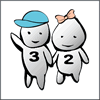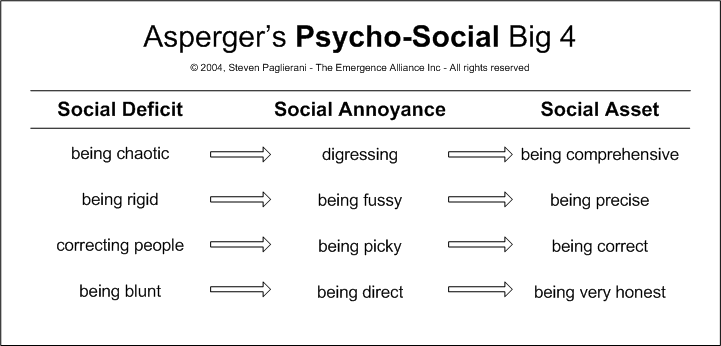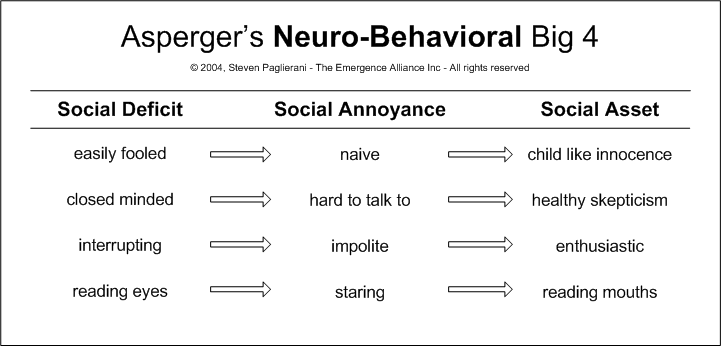|
Have you ever wondered how people with Asperger's can be so smart at some things and so lost in others? In this article, I briefly explore this paradox, by naming eight separate qualities which characterize people with Asperger's.  
  The Social Paradox of Asperger'sPeople with Asperger's are different. Socially, they struggle. And their struggles cause others to struggle. Yet so many great contributions to our world were made by people with Asperger's. Take Socrates. Here was an incredibly insightful man who had the social skills of a bull in a china store. Yet who in the Western world can deny we have forever been affected by his maxim; "the unexamined life is not worth living." Blunt? Yes. Always correcting people? Yes. Rigidly sure of himself? Yes. Utterly chaotic to the normal folks around him. Absolutely: you never knew what he might say to you. So how could this man, who, in all likelihood, had Asperger's; who, in fact, was probably sentenced to death for having it; how could he have contributed so much to the way we socially connect to each other? This is the paradox of Asperger's. It is also the point of this article. Seeing Both Sides of an ArgumentCommon wisdom urges us to see 'both sides of an argument"; good advice if you can do it. I also see, as good advice, the similar ideas that "character defects" are simply "assets out of proportion" and "the right thing done at the wrong time." How do these ideas apply to people with Asperger's? People with Asperger's are in the social minority. I know. I have Asperger's. Because we are in the social minority, we get told it is we who are socially deficient. Are we? In certain ways, yes. We do struggle to connect to those around us. On the other hand, most people with Asperger's have an incredible ability to connect to the world itself, meaning, to the things we see and hear and touch, to the sky and to words and to the details in life. Given, of course, we find the subject interesting. Add high IQ to the mix and you have an Einstein or a Da Vinci. The problem, of course, is that people with Asperger's make ideas more important than people; getting at the truth more important than getting along with others. This makes it tough for those around the person, especially when the normal people constantly misread the motives of the people with Asperger's. People with Asperger's are not uncaring. Mostly, we are caring people who keep doing the "right thing at the wrong time." Can we change? I believe we can. In fact, to a great degree, I am certain of it. I have changed. How? By identifying the patterns which in essence make us different from socially normal folks. And by becoming what I fondly refer to as "socially bilingual"; meaning, by learning to see both the negatives and positives in our way of being.  the Asperger's Psycho-Social Big 4What you see in the drawing above is something many people with Asperger's love: a table. In fact, even kids with Asperger's love these devices. Why? Because they help us discover the patterns which are often hidden in the details, an experience which in many ways, resembles the solving of a wonderful mystery. Does it now make sense why some Asperger's kids love things like train schedules and baseball statistics? And why normal folks have trouble seeing the beauty in Chaos Theory? So what hidden patterns does this table reveal? What mystery does it attempt to solve? The mystery of how people with Asperger's can be so smart and yet so socially inept. Would you like to begin to understand this mystery? If so, you'll have to try to think like us for a moment; which is to say, that within this table lies a wonderful mystery, if seen through the eyes of someone with Asperger's. Going into shock trying to grasp what I'm saying? Relax. It's a lot easier than it looks. Now try to see the patterns hidden in the words. You can begin by noticing how I've arranged the words into three columns, each row grouped from negatives to positives. Thus, if you look at the first phrase on the top left, what you'll see is the phrase, "being chaotic." Next look to the word just to it's right; "digressing." Finally, look at the phrase all the way to the right; "being comprehensive." These three columns describe an element of Asperger's; from a social deficit to a social asset: from "being chaotic" to "being comprehensive." Please know, these three things are, in essence, the same thing just done at different times. How? Let me show by giving you a real life example. Have you ever had to endure an onslaught of details from a person with Asperger's? Or the five hundred and seventy two digressions set off by asking a person with Asperger's a single question? If so, you know how overwhelming these conversations can be. Did you realize, though, that the person's primary motive was to share with you something beautiful they had discovered about the world in which we live? OK. So you couldn't care less how the buttons on a confederate soldier from Alabama differed from those on the jacket of a confederate solder from South Carolina. But who better to go to if you did want to know? Here, then, is the point I'm trying to make. To people with Asperger's, what they've offered you was meant to be comprehensive, precise, correct, and very honest. And yet, what you've probably witnessed felt chaotic, rigid, meant to correct you, and blunt. Worst than all of this though, was how if felt to be you personally: you felt totally unseen. People with Asperger's never intend you to feel this way. Indeed, when they see they've done this to you, they often feel quite remorseful. Are you starting to see the two sides of Asperger's? Want to see a bit more? I offer following with the hope it may help you to get a genuinely personal picture of a person with Asperger's; the person behind the onslaught of facts. An Asperger's Baby PictureI believe Asperger's is an extended stay in the third developmental stage of learning; learning to "understand ideas." And in order to try to help you to see this for yourself, I need to ask you to actually picture the following. Picture a little boy, about nineteen months old. Can you see his blonde hair? His first real shoes? His toddling gait? Now try to picture him standing in front of you, reaching as high as he can, holding up a small yellow bus. "Bus," he tells you proudly. Can you see his excited face? He is smiling and so wanting you to know what he's discovered. Now look closer. In fact, rewind the tape which just played on the screen of your mind, and this time, watch where his eyes focus. If you watch very carefully where his eyes look, what you'll notice is, he focuses more on your mouth than on your eyes; and even more on the bus than on you. Let's try again, this time though, see a little, twenty-two month old girl, holding up a tiny pink teddy bear. How do you feel inside as she struggles so hard to show you what she's discovered? People with Asperger's do not outgrow this stage. For whatever reasons, they remain this way; excited to discover and to tell you about the mysteries they've solved. Unfortunately, though, these mysteries rarely include the social aspects of being with the people in our world? You see, babies don't develop this interest until the next developmental stage of learning, the stage wherein babies begin to "force social connections regardless of what you think or know." In this stage then, babies focus on freedom and rebellion. Remember, now, that I've suggested that people with Asperger's do the right things at the wrong times. This includes babies with Asperger's. What do babies with Asperger's do wrong? Many babies with Asperger's become "hyperlexic," meaning, they collect and organize tons of words. In fact, one young mother who recently wrote to me told me her nineteen month old sons knew 500 plus words, and all his shapes and colors. Is this normal? Of course not. So what will happen to this little boy? Eventually, he may organize these words into a table. Or into a matrix. Or into a database. And if this becomes his obsession in life? He may eventually write a dictionary. So now, rather than me assuming that you actually want me to detail the whole table, let me simply suggest that if you want to, you can review the rest of the table yourself. Just remember, the rows read left to right, from social deficit to social asset.  An Asperger's Behavior TableOK. Yes. It's another table. I do, after all, have Asperger's. What is it I'm trying to show you this time <grin>? More patterns. And more continuums from negative to positive. For instance, the second line; closed minded to healthy skepticism; is the same thing. Thus, what you see it as depends on when and in what context you see it. For example, say you are trying to make your point with a person with Asperger's and the person just won't budge. Frustrating, right? Yet what about the times you, yourself wish you had had someone there to teach you the fine details of something, someone who could have pushed you a little harder, made you look just a little deeper. How we see these thing depends a lot on how they affect us. Here again, rather than go through the whole table, let me just leave that to you. I'll let your interest dictate the level of details. All except for one point. A small thing really. But something which has begun to fascinate me. The point? Have you ever watched how people who are hearing impaired read mouths more than eyes. People with Asperger's do this too. How about how people who are hearing impaired are often blunt and impolite. And many times, very, very enthusiastic too. People with Asperger's do these things a lot too. And the "closed minded," "hard to talk to," "healthy skepticism?" And the "easily fooled," "naive," and "child-like innocence?" Does it seem strange to you too that these two dissimilar groups can have so much in common? Am I making a point? Let me leave the point to you; another paradox of Asperger's. Steven more on Asperger's and how it connects to other autisms ...What's it like to have Asperger's? a Young Mother Asks |
.